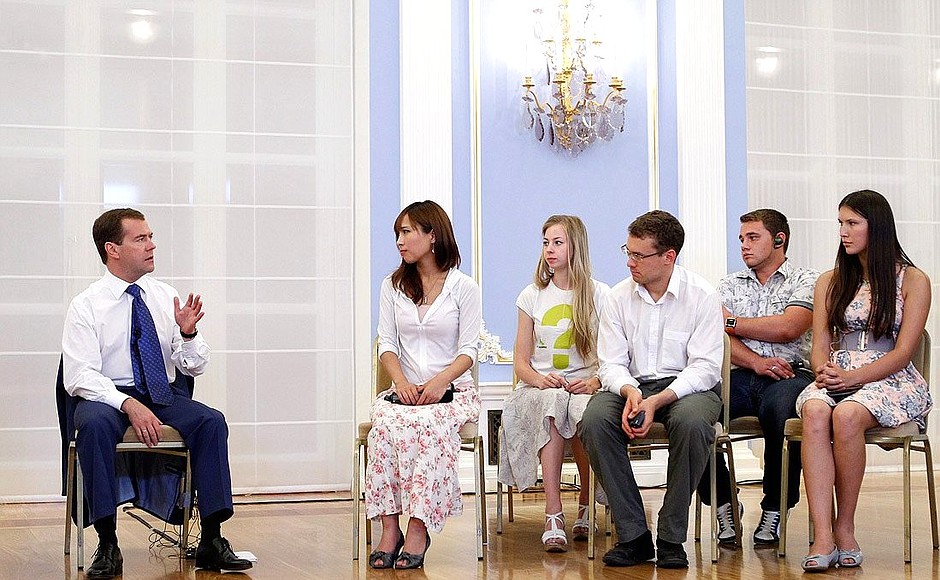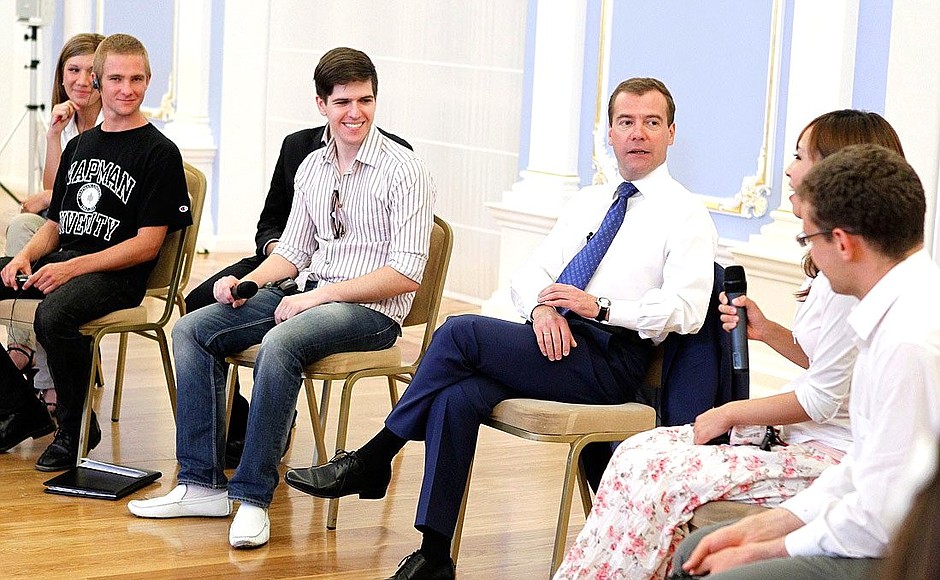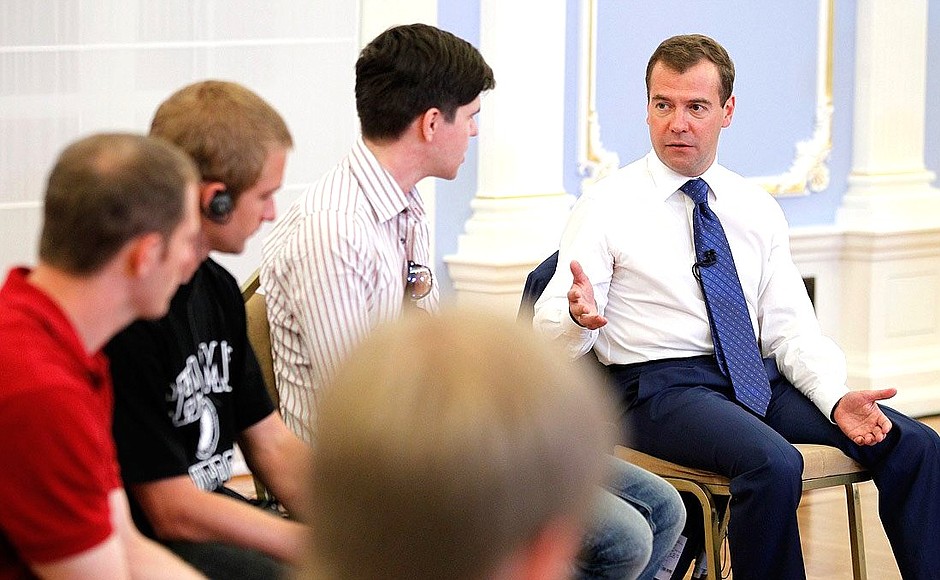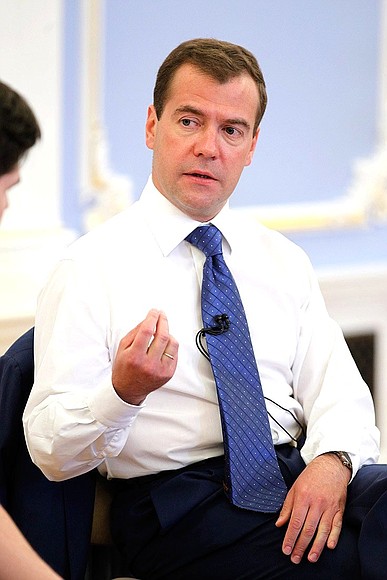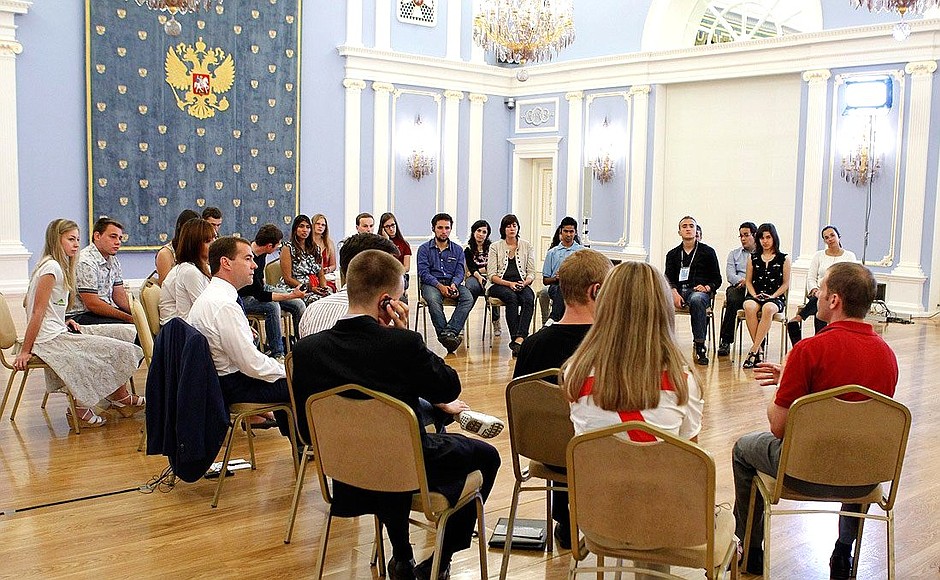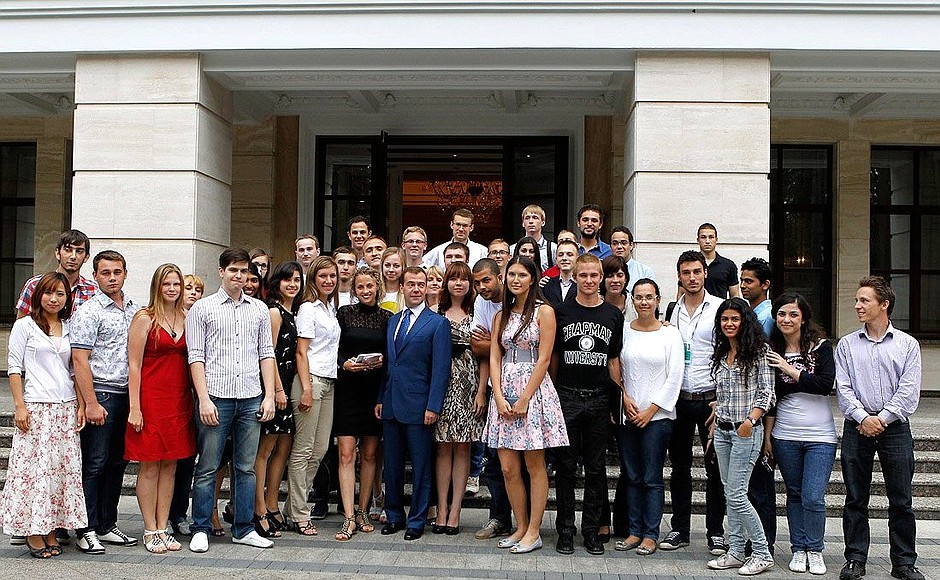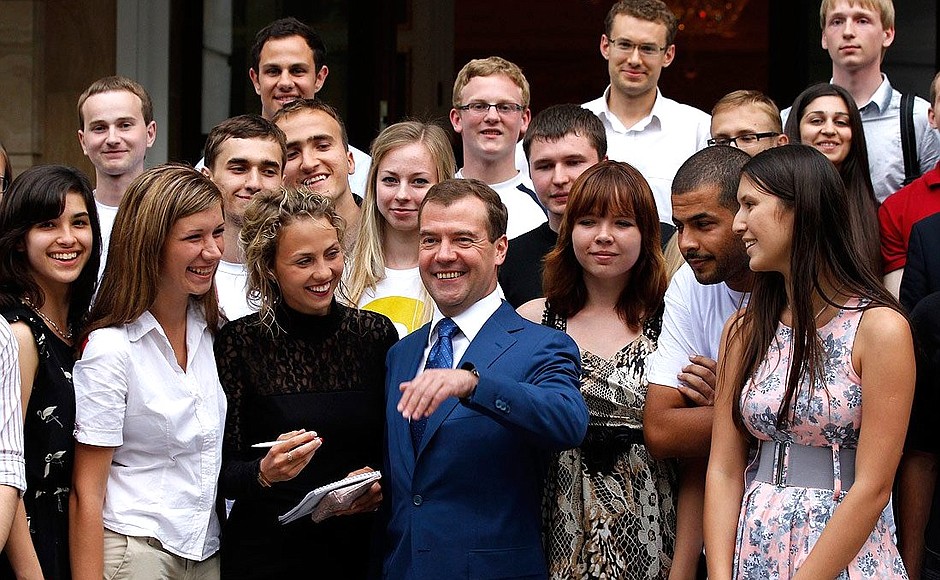The meeting was attended by forum's participants from Russia, the United States, Japan, France, Germany, Italy, the United Kingdom and other countries.
* * *
President of Russia Dmitry Medvedev: Good afternoon. Welcome, I am happy to see you.
I don’t know what to start with because clearly there is no need to tell you that Seliger has become part of Russian life and the forum which has taken place and will continue to take place is fascinating and involves a lot of young men and women from around the world.
As I understand, the international session has just finished and the people present here today represent different states. I would like to thank you for coming to Russia. I hope you had a good time and saw for yourselves that this is not an event organised by the Kremlin as part of its PR campaign but something far more meaningful. Anyway, you will tell me about that.
I have often been at Seliger. I like the atmosphere there because it is very special. Different people come together and discuss a wide range of issues, including our future. Our future is a global world and innovation. In fact, that is usually the focus at Seliger. But if you tell me something completely different, unconnected with global world and innovation, just something amusing, I would be very grateful to you too. So, let me stop at that and you can tell me about something.
Ayumi Tsukamoto (retranslated): I'm from Japan and this is the second time I am participating in the Seliger forum. I would like to thank the Russian Federation and you, Mr President, for your support to Japan after the tragic events following the earthquake. Here in Russia I saw that many Russians have warm feelings toward Japan and help Japan, and I was very happy to see such support and response from the Russian people.
My first question. In view of the tragedy that struck Japan, what kind of measures can Russia take to address these issues?
Dmitry Medvedev: I would like to say once again that the Fukushima tragedy truly shocked the entire world as well as Russia and our people. You were absolutely right in saying that there was a genuine impulse to express condolences and provide assistance. This tragedy has shown that despite the fact that we have been investing in the most advanced high-tech areas, despite the fact that innovation generates money and is an integral part of our lives, the world is still very fragile. Very fragile, and we must draw conclusions from such disasters. What conclusions?
Our conclusions are as follows. First, such disasters should be, if possible, foreseen and prevented and their possible consequences must be minimised. That is very difficult. There are those who say today: ”You know, they had wrong standards in Japan.“That is only half the truth, although in reality, of course, the higher the safety level at such facilities, the better.
We had our share of suffering with the Chernobyl disaster. After that, our nuclear safety standards became very stringent, as confirmed by subsequent practice. But this does not mean that everyone is insured against everything. The main thing is that we must learn our lessons.
I think in this situation it is very important that we agree with other countries, including Japan and other states, on the way our nuclear power industries will operate, because today humanity simply cannot give it up.
There are some countries that say, ”No, we will not do anything, we will close everything down.“But I think first of all it would be very difficult. Second, if they shut down nuclear power stations they will increase their consumption of hydrocarbons. That may seem to be good for Russia since we are a very rich country in this sense, but it would mean that the greenhouse effect and CO2 emissions in the atmosphere will be increased substantially.
Therefore, the nuclear industry must live but it will live under new rules. We have put forward a set of proposals, which I voiced during the G8 summit, where I met with Japanese Prime Minister Naoto Kahn. I would like the entire international community to consider these proposals and the IAEA to adopt them. If that happens we will obtain a more secure system to protect us against such problems. This is a challenge for all of us to tackle together.
I would like to add that we sincerely wish all Japanese people to leave this tragedy behind, despite the fact that, of course, people cannot be brought back and that is the most tragic consequence, to mobilise their resources, to restore the economy and move forward. We all know that the Japanese nation can do it brilliantly. The history of the past 60 years is a story of Japan’s brilliant recovery as a nation.
I wish you every success in this.
Ayumi Tsukamoto: Thank you.
We were invited here from Japan for this forum. I come from the area where the tragedy took place. Yesterday we observed a minute of silence.
It was a real pleasure for us to share our impressions and our experiences of meeting people. We had a very good time at Seliger. Personally, I believe that what is most important is ties between people, which help develop relations between countries. I would like to contribute to the development of friendly relations between our countries.
I would also like to ask another question, if I may.
I lived in Vladivostok for two years. I saw the city and the region grow, especially in the context of preparations for the APEC Summit.You visited Vladivostok a few days ago. What is your vision of that region and its future after the APEC summit?
Dmitry Medvedev: It's great that you came here because there are all sorts of historical ties between Russia and Japan, there are large economic projects, we communicate at numerous political forums, but there are also various historical subjects that are difficult to talk about. And the fact that you speak with such ease about everything shows that there must be a new and modern way of thinking that is shared by Japanese people and the people of our country.
With regard to the Far East, it’s very simple. The main thing is that it continues to develop along with the entire region. However, it has its own problems, and those problems may be diametrically opposed to the ones experienced by Japan.
Vladivostok as part of the Far East is a wealthy region but its population is relatively low. Perhaps it is not that low for our country: Vladivostok is home to around 600,000 people. But unfortunately the population of the Far East as a whole is not that large. That is why the region’s development is tied in with attracting young people to go live and work there, to creating new jobs, and in that case, the region will have a brilliant future.
As for the APEC Summit, I was in Okinawa in 2000, when the summit was held there. What I liked particularly was that Japan invested a lot of money in it. At first I thought, why was that necessary? The summit will be over in two days, everyone will go home and forget about it. And then I realised that it was a fantastic way to develop the region.
That is also our approach to the APEC summit in Vladivostok, just as to the 2014 Olympics, because it is more than a major political or sporting event; it is an opportunity to give an impetus, an investment drive, to make sure that people came to the area, and to develop tourism. So I hope that Vladivostok will become a far more interesting city after 2012 than it is now.
The changes are very impressive already. I've just been there, as you said. There is a lot of construction going on, it’s a real joy to watch the sites. I liked it so much I took some photos and posted them on Twitter yesterday as proof of how quickly everything is changing there.
Ayumi Tsukamoto: Thank you very much.
My university will also participate in the APEC Summit in 2012. Are you planning to visit Vladivostok in the near future?
Dmitry Medvedev: I will go there regularly.
Ayumi Tsukamoto: Thank you.
Ruslan Vikhlyantsev: Hello. My name is Ruslan. My question has to do with a completely different subject. It’s about the Internet.
Dmitry Medvedev: I thought you were going to tell me something.
Ruslan Vikhlyantsev:I will. I graduated from the university recently…
Dmitry Medvedev: Congratulations. Which department?
Ruslan Vikhlyantsev: St Petersburg State University of Culture and Arts, the Media Design Department.
Dmitry Medvedev: Great, that's fascinating.
Ruslan Vikhlyantsev: I’ve started videoblogging recently and I heard that you are interested in this as well. In fact, we can say that you popularise the Internet, as you have registered and set up your own video sharing website. A huge number of people joined in after that. You’ve got a Twitter feed and a lot of people started using it as well. I have been literally following you step by step. And so I have the following question.
Could you tell us in confidence how you are going to develop your online presence? We have all noticed that e-governments and so on are being introduced, so there is a trend towards online elections. Perhaps you could tell us which services you are going to use so I can stake out a place. You are literally the leader of the Russian online community: you have almost 400,000 followers on Twitter. That is 400,000 more than me. Therefore, from a professional point of view, maybe you could share your secret of this unprecedented popularity?
Dmitry Medvedev: Let me start by explaining why I have an online presence at all, as you say. The answer is simple: I think it’s fun. If I didn’t enjoy it but did it just because I realise that it’s required of me since all politicians today have an online presence to a greater or lesser extent, I would have paid much less attention to it. But in fact I really do think it’s great fun.
I first became interested in the Internet sometime around 1997, which is quite a long time ago, when the Russian segment of the Internet was just starting out. It existed but it was very limited, so in that sense I am an old-timer.
The Internet is an extremely interesting and unique environment. I think everyone realises that the impact of the Internet on social life, politics and the economy will grow with each year. Someone who is unable to get connected or to dissolve to some degree on the web will most likely fail to become a modern person.
This does not mean that the virtual world will suppress reality. Of course not – the real world is still much more fun. But the virtual world is beautiful in its own way. So I believe that anyone who uses the Internet at least adds something to his or her spiritual development.
There are a lot of very useful things and a lot of rubbish on the Internet, but in the end each person must decide for oneself. Ultimately, that is what freedom of choice is all about: what to do, what to watch, who to communicate with. The communicative value of the Internet is unparalleled.
Second. The Internet has already become a vital business environment. We should not underestimate the role of electronic communication, e-government and various electronic resources which many people use today. In our country things are not that great in that respect. We are introducing all this, but the process is much slower than in some other countries. That is not great for us, because what does it mean if there is no full-fledged e-government and if e-services are underdeveloped? The bureaucracy is stronger – it is an absolutely direct relationship.
The more services are provided in electronic form, the less the impact of bureaucracy on our daily lives, and you can find plenty of people who don’t like that in any country. In Russia, America and Japan people don’t like officials too much, though everyone understands that they are a necessary evil. No country has ever managed to get rid of officials. But there are some things that are much easier to do using e-government, such as the usual transactions entered into by people, documents they need to obtain, paperwork they must submit, and numerous other things. In this respect, I believe there are many advanced countries where everything is done very quickly, and we have a lot to learn from them.
I remember when I was in Singapore – and I’ve told this story before – they offered me to register a company just so that I tried it for myself. I said, “OK, let’s do it.” I went over, spent five minutes at the computer, made up a name for the company and its activity. They asked, “What do you want to do? Maybe you could open a Russian restaurant?” I said, “OK, why not? There probably aren’t that many of them in Singapore.”
So I did all this. They said: ”That’s all. You’ll get a notice in seven days. Since you did not ask for any licenses, everything will go smoothly.” I did all this and said, “Cool, great.” Then I went away and forgot about it. The most surprising thing for me was that after a while someone from the Executive Office came to me and said, “You know, they’re asking us to do something with this restaurant.” The restaurant actually exists and we must do something with it. So if anyone here has an interest in setting up a Russian restaurant in Singapore, I invite you to join me as a partner. It works, and it really makes life easier.
How does it often happen in Russia? People take months to register their companies, even though we have been working on creating a one-stop service for a long time. The company documents can be registered quickly but it takes ages to get all kinds of permits. That is a big part of the process.
There is another aspect. I think it is crucial for a state leader to try to follow mainstream social processes simply to keep up. That’s why it seemed right to have an online presence, and that’s why I have a fairly well developed website and a video blog. I post on Twitter from time to time. Apart from everything else, it’s an opportunity to get feedback.
Today, for example, I looked something up in the morning, contacted several colleagues over various issues, and had a look at what’s going on with Twitter. From time to time I come across things there that aren’t just standard responses like, ”Thank you“ or ”I’m completely fed up with you, you never do anything.” Sometimes there can be quite substantial things like “Pay attention to this, or please help me because I cannot break through some walls.” I try to follow up on these things with instructions as far as I can though of course it’s impossible to respond to everything.
Finally, let me say a few words about popularity. Twitter is only starting to gain momentum in Russia, so I think you'll have excellent numbers soon too. Especially after today's conversation, I think you can move it forward. On the other hand, Barack Obama has even more followers…
Ruslan Vikhlyantsev: He has a bigger audience.
Dmitry Medvedev: Yes, he has a bigger audience. And then America is different country. For them Twitter is an election resource. My Twitter feed appeared simply as the Twitter of the Russian President, whereas his Twitter was sculpted as an election campaign resource. So everyone who supported him became a follower. Well, maybe not everyone but a significant part. Therefore, another piece of advice on how to achieve success on Twitter is to run for President.
Ruslan Vikhlyantsev: I am in the wrong age group.
Dmitry Medvedev: No problem.
Ruslan Vikhlyantsev: Maybe I should just set up an election resource?
Dmitry Medvedev: Absolutely. Set up an election resource.
One last point: the Internet and democracy. We could say a lot of different things about the Internet. It is a unique part of the modern democratic world. It is another thing that the Internet often has no direct influence on political events, but sometimes it does.
Just think about the events in in the Middle East and North Africa, where the Internet, including Twitter, became a powerful political resource. But this is such a spontaneous resource and I'm not sure that spontaneous resources have a great future.
Now if we can imagine a situation where, say, people’s preferences are determined with the help of the Internet, not in the usual sociological sense but in terms of their political preferences, then the Internet will become a fully-fledged political resource. Then voting on certain issues, for example, local referenda or some other ballots will be done online. And people will not have to leave their homes because if you can submit a tax return online then why can’t you vote on any issue? That is how I see the Internet’s great political future.
I wish you success in this environment.
Ruslan Vikhlyantsev: Thank you very much. I am very glad that you are willing to spend your time online, communicating. I hope that it’s not too boring for you.
Dmitry Medvedev: No, it’s not boring.
Ruslan Vikhlyantsev: I’m glad to hear it. I subscribed to your Twitter feed.
Dmitry Medvedev: Good. I will follow your political career. We have great opportunities. We have services that will track your development.
Who would like to say something? Go ahead, guys.
Andrew Macgeehan: Andrew MacGeehan, USA, from Chapman University of California. I study international relations and diplomacy. I want to thank you and the Seliger organisers for this meeting. I have met here with people from many different countries, and I did not expect this.
The organisation for youth affairs invited 15 students from the USA last November. I want to know, will you continue to support your contacts with our organisation on a long-term basis, and will you come to visit us in September?
Dmitry Medvedev: I think that exchanges and visits bring people closer together, but to be honest, I’m not sure about coming to your event… When did you say it would be, in November?
Response: In September.
Dmitry Medvedev: I’ll have to look at my schedule. In principle, I am ready to come and take a look for myself. I think it would be good.
Andrew Macgeehan: Thank you.
Dmitry Medvedev: Are there others with something to share with us? Go ahead.
Anna Levchenko: I have been working on paedophilia problem for three years now. This is a big problem, a serious problem in our country, as you know. Thank you for making the effort to fight this scourge of modern society. I want to tell you about what I am doing and about the problems we encounter.
Over the last six months I have identified more than 30 sites where paedophiles are in contact with each other, and which spread child pornography. I succeeded in getting a big chat closed down on one of the social networking sites. It was buying and selling children for sexual exploitation for 40,000 rubles. In other words, anyone could just buy a child without any problem.
We also track down the sites propagandising paedophilia, and track down the paedophiles themselves. We have developed a method for tracking them down using the Internet. We identify who they are and pass the information on to the law enforcement agencies for further investigation.
What are the problems we face? Over the last six months, the number of people helping us has increased. They include people from the state agencies, and from the Investigative Committee, and also just people who are not indifferent to our work and want to help. We have already accomplished a lot, but our efforts are a lot like guerrilla warfare in a way. We are fighting the paedophiles, but we don’t have a common organisational base that could help us to get these problems addressed at the state level.
What I’m proposing, in other words, is that we set up a monitoring centre with people working there to address these issues in systemic fashion, that is, track the child pornography, identify the specific criminals, and track down extremist material. There is a special division in the Interior Ministry that works on this, of course, but they have more than they can cope with alone. We want to help them in their efforts. We have all the resources we need for this monitoring centre. All we need is your assistance in getting it set up, so that it can be done at the official level.
Another big problem is that the social networking sites do not bear responsibility for their content. We and the law enforcement agencies end up having to work long and hard to persuade them to remove the child pornography from their sites, but they do not do this, because the law only makes the users responsible. I propose introducing fines at the least for companies that refuse to take action if illegal content is found on their servers.
I also want to know what you think about the idea of setting up sites with databases of paedophiles here along the lines of American sites. We have the resources to do this too, but want to know your opinion. Do you think our country needs this?
Dmitry Medvedev: This is indeed a very serious problem. It affects not just Russia but the entire world. It must be admitted, though, that we have seen an upsurge in this kind of activity over recent years. This is due to a number of things, one of which is new technology, and this is for evident reasons. The internet medium and the various social networking sites create more opportunities for this kind of things than real life. In the past after all, it was somewhat easier to find these people, catch them in the street, perhaps, easier than online, anyway.
I think this is the price that we’ve ended up paying for the openness of the internet environment. This makes it all the more a difficult task to work out how to resolve or at least minimise this problem without at the same time undermining the foundations of the global information world that we have today.
I am sure after all that you and the others here do not want us to simply close everything down and then say, “well, now everything’s fine, we’ve put it all under lock and key, and there are going to be no more such contacts on the Internet, because the Internet doesn’t exist anymore”.
But we must do something, only what? What steps have I taken, and what steps will take from here? We have improved the laws on responsibility for these kinds of crimes, for very serious crimes against children. We have made a number of amendments to the criminal law in this respect.
There are other proposals too, of which you are aware, as you follow this issue. These proposals should go through too, though views differ on them. Some say they will help, and some say they won’t. I am referring in particular to the proposals regarding chemical treatment for people who commit these kinds of sexual crimes. Not all countries support the use of such methods, but overall, it is better to try them than to do nothing at all.
As for how to proceed from here, I think the idea of a monitoring centre is perfectly reasonable in principle. I would make the following proposal regarding where to set it up. The Interior Ministry is a good organisation of course, but investigations come primarily under the Investigative Committee. Furthermore, the head of the Investigative Committee takes a fairly active stand on this matter. He is not indifferent to the issue, has been consistent in addressing it, and has sent me a number of proposals on introducing changes to the laws.
This centre could be set up somewhere alongside the Investigative Committee. It must not be an actual part of the Investigative Committee, because it should not be a state body, but can work alongside it. This would give you an information resource and also access to some of the possibilities the investigative bodies offer, for they are able to react to some things directly and rapidly. I think this could be useful. If you think this idea is good, I can discuss it with the heads of the Investigative Committee.
Anna Levchenko: Thank you very much. We are ready to work of course. It is a very good idea, and we know that the people working in the Investigative Committee are real professionals.
Dmitry Medvedev: Good, then that is agreed.
As for the online networks, that is a more complicated issue to be honest. Most countries do not make the owners of social networking sites directly responsible for the content that users place directly on their servers. At the same time, there are problems not just of violation of basic human rights, but also of copyright laws, for example. It is very hard to prevent all of this.
I have my own views on this issue. I am not talking about fighting paedophilia right now, but about the whole Internet regulation of issue in general. You have to realise that the social networking sites’ owners and the providers cannot bear unlimited responsibility for the content, otherwise we would end up shutting down the entire Internet.
Another problem is that it is far from easy to catch them all. There are some resources after all… You realise that this is all a closed corporation. They might be online two or three hours and then vanish, but this exchange of information continues. We are to reflect on a new convention for regulating copyright on the Internet in general. But not everyone supports my position here.
I discussed this issue recently with my G8 colleagues. The British prime minister took a similar view to my own, but my other colleagues differed in opinion. I think, however, that we cannot use traditional copyright law on the Internet. Let me explain why I bring this up. It has many implications for the responsibility of providers and of the social networks’ owners. I think that we will therefore have to reflect on common approaches to regulation.
If we do revise the rules, and I say quite frankly that I know this will be a tough job for the lawyers, though nonetheless potentially realistic, and if we can arrive at some new regulation system for the copyright holders, the owners of social networking sites, the providers, and the online media, I think we would probably then be able to influence the situation you are talking about.
I think that a simple ban would not be effective, but this does not mean that we should not take action against those who organise these kinds of sites. This is precisely the area where direct and clear action is required. If someone has specially set up these kinds of resources – this is a crime, a crime under Russian law, and in other countries too, and they must be prosecuted accordingly. That is all I can say for now.
Anna Levchenko: Do you think we should introduce responsibility for propagandising paedophilia?
Dmitry Medvedev: Legal responsibility?
Anna Levchenko: Regarding the sites on which…
Dmitry Medvedev: Wait a minute, remember that I am a lawyer by profession after all. Are you talking about criminal liability for that actual act of propaganda, that is, for spreading information of a paedophile nature, but without actual acts of violence committed?
Anna Levchenko: Yes.
Dmitry Medvedev: We would need to think here. The question is, who would define what constitutes propaganda of paedophilia?. This is not always a fine line to draw after all. Back in the Soviet Union, not that you remember that time, the law imposed strict liability for anti-Soviet agitation and propaganda. It was a somewhat comic provision in the law really, and yet people were actually charged under it and faced serious penalties.
It was enough to complain about the Soviet system to have committed a crime under this law. In other words, if you said, “the Soviet Union is a bad country”, that was it, that was enough to get you charged. It constituted a crime in the eyes of the law. I recall this example because we would have to think about what exactly would be defined as constituting a crime under the kind of provisions you propose. Would it be enough to simply express a few thoughts on the issue for it to qualify as a crime? The experts will have to study the question. I’m afraid that taking administrative zeal into account, we could end up causing a lot of chips to fly.
Anna Levchenko: Thank you very much.
Ivan Yesin: Mr President,
I am one of the developers of a system for monitoring forest fires – Forest Watch. We all know just how relevant forest fire monitoring is today.
The current system in place detects fires covering an area of 20 hectares or more, and it updates information no more frequently than four times a day. This is not enough to detect fires at an early stage.
Our system offers uninterrupted detection of forest fires of less than one hectare at a distance of up to 30 kilometres from the monitoring site either in manual operation, or in automatic regime without needing an operator present. The system works on the basis of data received from various smart data sensors, including video cameras, heat sensors, and infrared sensors placed on telecommunications towers.
Using our system would make it possible to reduce the costs involved in monitoring fires, reduce the economic damage, and perhaps even help to reduce the cost in human lives too. But we face a number of problems in getting our system in place. It often happens that state contractors, and they usually are from the state rather than the private sector, fear innovation, or are not ready to try it out, and we often have big problems in working together with the mobile telecommunications operators too.
Perhaps we could get some of these problems solved if you helped us in organising cooperation with the mobile operators through the Telecommunications Ministry, for example, and recommended our system to the forestry agency, say. Perhaps we would then be able to somehow resolve this problem of forest fires…
Dmitry Medvedev: If not resolve, then at least stabilise it.
But tell me, has your system been tested? Where has it been used? I am not suggesting it is not a good system.
Ivan Yesin: We are setting it up and using it actively, and it is already operating in Nizhny Novgorod, Tver, Vologda, and a number of other regions…
Dmitry Medvedev: So, this is already a real and functioning system?
Ivan Yesin: Yes, it is already up and running. I can give you some statistics. Over the last year, for example, it detected 12 percent of the total number of fires in Tver Region, though it covered only 7 percent of the region’s territory, and 25 percent of the fires in Nizhny Novgorod Region, though it covered only 10 percent of the territory. This shows the system’s effectiveness.
Dmitry Medvedev: I see.
I have a simple proposal. If your system is already quite well tested and has gained some recognition, and all you need is an appeal to the relevant organisations, I am willing to suggest to the Telecommunications Ministry that they work with the mobile telecommunications operators on this. They simply need to know what exactly this work would entail. Will they have to provide some kind of free service?
Ivan YESIN: No, it’s simply that the process of getting the technical conditions approved with the mobile operators often gets very drawn out and takes a long time.
Dmitry Medvedev: I see. Then I propose that you send all the information to me.
Ivan YESIN: I will do this. Thank you very much.
Dmitry Medvedev: We will get on to this.
